- Home
- Cao Xueqin
A Dream of Red Mansion Page 2
A Dream of Red Mansion Read online
Page 2
“We’ve reached the Land of Illusion.”
He passed with the Taoist through a large stone archway on which was inscribed: Illusory Land of Great Void. A couplet on the two pillars read:
When false is taken for true, true becomes false;
If non-being turns into being, being becomes non-being.
Shiyin was starting after the two immortals when he heard a fearful crash, as if mountains had collapsed and the earth split asunder. With a cry he woke up and stared about him. There was the fiery sun still blazing down on the rustling plantain leaves. Already half of his dream had slipped his mind.
The nurse came up then with Yinglian in her arms, and it struck Shiyin that his daughter was growing prettier and more lovable every day. He picked her up and played with her for a while, then took her to the gate to watch a religious procession pass by. He was just about to go in again when a monk and a Taoist priest drew near, laughing and gibbering like two maniacs. The monk was barefooted, his head scabby; the priest, lame with tangled, tousled hair. When they reached Shiyin’s gate and saw the child in his arms, the monk burst into lamentations.
“Why are you carrying that ill-fated creature, sir?” he asked. “She will bring nothing but trouble to her parents.”
Shiyin thought the man was raving and paid no attention.
“Give her to me!” cried the monk. “Give her to me!”
Losing patience, Shiyin clasped his daughter more tightly and was turning to reenter the house when the monk pointed at him and let out a roar of laughter. He then declaimed:
“Fool, to care for this tender child:
An image in the mirror, snow melting away.
Beware what will follow the Lantern Feast,
The vanishing like smoke when the fire burns out.”
Shiyin, hearing this clearly, wondered what it meant. Before he could ask, the Taoist told the monk:
“This is where our paths divide. Each must go about his own business. Three aeons from now I shall wait for you at Mount Beimang, and together we can go to the Land of Illusion to have this affair expunged from the register.”
“Very good,” said the monk.
Then both vanished without a trace.
Shiyin realized then that these were no ordinary men and regretted not having questioned them. His rueful reflections were cut short by the arrival of a poor scholar who lived next door in Gourd Temple. His name was Jia Hua, his courtesy name Shifei, and his pen-name Yucun. A native of Huzhou, he was the last of a line of scholars and officials. His parents had exhausted the family property and died leaving him alone in the world. Since nothing was to be gained by staying at home, he had set out for the capital in the hope of securing a position and restoring the family fortunes. But by the time he had reached here a couple of years ago his money had run out and he had gone to live in the temple where he made a precarious living by working as a scrivener. For this reason Shiyin saw a good deal of him.
Having greeted Shiyin, Yucun asked, “What are you watching from your gate, sir? Is there any news in town?”
“Nothing,” was the reply. “My little girl was crying, so I brought her out to play. You couldn’t have arrived at a better moment, as I was feeling thoroughly bored. Come in and help me while away the long summer day.”
He told a servant to take his daughter inside, and led Yucun into his study, where a boy served tea. They had not exchanged many remarks when a servant hurried in to announce the arrival of a certain Mr. Yan.
Then Shiyin excused himself, saying, “Forgive my rudeness. Do you mind waiting here for a few minutes?”
“Don’t stand on ceremony, sir,” said Yucun, rising. “I am a regular guest here, I don’t mind waiting.”
So after Shiyin went to the front room Yucun passed the time by leafing through some books, until he heard a young woman coughing outside. He slipped over to the window and looked out. It was a maid picking flowers. She had uncommon features, bright eyes and graceful eyebrows, and although no great beauty she possessed considerable charm. Yucun stared at her, spell-bound.
Just as she was leaving with her flowers, the girl abruptly looked up and caught sight of him. His clothes were shabby yet he was powerfully built with an open face, firm lips, eyebrows like scimitars, eyes like stars, a straight nose and rounded cheeks. She turned away thinking to herself, “He’s a fine-looking man for all his tattered clothes. This must be the Jia Yucun my master keeps talking about, whom he’d gladly help if only he had the chance. Yes, I’m sure it’s him, our family has no other friends who are poor. No wonder my master also says he’s a man who won’t remain long in this plight.” She could not resist looking back a couple of times.
Yucun seeing this was overjoyed, thinking that she must have taken a fancy to him. He decided that she had good judgement and was one of the few who could appreciate him in his obscurity.
Presently the boy came back and let Yucun know that the guest was staying to a meal. Since this made it out of the question to wait any longer, Yucun went through a passage to the side gate and left. And after the departure of Mr. Yan, Shiyin did not trouble to invite him back.
In time the Mid-Autumn Festival came round. After the family meal, Shiyin had another table laid in his study and strolled over in the moonlight to the temple to invite Yucun over.
Ever since the Zhens’ maid had looked back that day, Yucun flattered himself that She was well-disposed to him and thought of her constantly. As he gazed at the full moon, his thoughts turned to her again and he declaimed this verse:
“Not yet divined the fate in store for me,
Good reason have I for anxiety,
And so my brows are knit despondently;
But she, as she went off, looked back at me.
My shadow in the wind is all I see,
Will she by moonlight keep me company?
If sensibility were in its power
The moon should first light up the fair one’s bower.”
Having recited this, Yucun rumpled his hair and sighed as he reflected how far he was from realizing his ambitions. He chanted the couplet:
“The jade in the box hopes to fetch a good price,
The pin in the casket longs to soar on high.”
He was overheard by Shiyin, who arrived just then.
“I see you have high ambitions, Brother Yucun!” he joked.
“Not in the least,” replied Yucun, somewhat embarrassed. “I was merely reciting some lines by a former poet. I don’t aspire so high. To what do I owe the pleasure of this visit?”
“Tonight is mid-autumn, commonly known as the Festival of Reunion. It occurred to me that you might be feeling lonely in this temple, brother. I’ve prepared a little wine in my humble place and wonder if you’d condescend to share it?”
Yucun needed no urging.
“You lavish too much kindness on me, sir,” he said, “Nothing would please me better.”
They went to the court in front of Shiyin’s study. Soon they had finished their tea and sat down to a collation of choice wine and delicacies. At first they sipped slowly, but their spirits rose as they talked and they began to drink more recklessly. The sound of flutes and strings could be heard from all the houses in the neighbourhood; everywhere was singing; and overhead the bright moon shone in full splendour. The two men became very merry and drained cup after cup.
Yucun, eight-tenths drunk, could not suppress his elation. He improvised a quatrain to the moon and declaimed it:
“On the fifteenth the moon is full,
Bathing jade balustrades with her pure light;
As her bright orb sails up the sky
All men on earth gaze upwards at the sight.”
“Excellent!” cried Shiyin. “I’ve always maintained that you were cut out for great things. These lines foretell rapid advancement. Very soon you will be treading upon the clouds. Let me congratulate you.”
He filled another large cup. Yucun tossed it off and then sighed.
�
�Don’t think this is just drunken talk,” he said. “I’m sure I could acquit myself quite creditably in the examinations; but I have no money in my wallet for travelling expenses and the capital is far away. I can’t raise enough as a scrivener....”
“Why didn’t you say so before?” interposed Shiyin. “I’ve often wondered about this, but since you never mentioned it I didn’t like to broach the subject. If that’s how things are, dull as I am at least I know what’s due to a friend. Luckily the Metropolitan Examinations are coming up next year. You must go as fast as you can to the capital and prove your learning in the Spring Test. I shall count it a privilege to take care of the travelling expenses and other business for you.”
He sent his boy in to fetch fifty taels of silver and two suits of winter clothes.
“The nineteenth is a good day for travelling,” he continued. “You can hire a boat then and start your journey westward. How good it will be to meet again next winter after you have soared up to dizzy heights.”
Yucun accepted the silver and clothes with no more than perfunctory thanks, then said no more of the matter but went on feasting and talking. They did not part until the third watch, when Shiyin saw his friend off and returned to his room to sleep until the sun was high in the sky. Then, remembering the previous night’s business, he decided to write Yucun two letters of introduction to certain officials in the capital who might put him up.
But the servant sent to ask his friend over bought back word, “The monk says that Mr. Jia left for the capital at the fifth watch this morning. He asked the monk to tell you that scholars are not superstitious about lucky or unlucky days but like to act according to reason; so he had no time to say goodbye in person.”
This Shiyin had to accept.
Uneventful days pass quickly. In a flash the merry Festival of Lanterns came round and Shiyin told his servant Huo Qi to take Yinglian out to see the fireworks and ornamental lanterns. Towards midnight Huo Qi set the little girl down on a doorstep while he stepped round the corner to urinate. When he came back she had gone. He made a frantic search for her all night. And at dawn, not daring to face his master without her, he ran away to another district.
Shiyin and his wife were naturally alarmed when their daughter failed to come home. They sent search parties out, but all returned without any word of her. She was the middle-aged couple’s only child, and her loss nearly drove them distracted. They wept day and night and were tempted to take their own lives. After a month’s grief Shiyin fell ill, and then his wife. Every day they sent for doctors.
Then, on the fifteenth day of the third month, a fire broke out in Gourd Temple—the monk preparing the sacrifice carelessly let a pan of oil catch fire and soon the window paper was alight. Since most of the nearby buildings had bamboo walls and were probably doomed to destruction, the flames spread from house to house until the whole street was ablaze like a flaming mountain. Soldiers and civilians tried to put out the fire, but it was beyond control. The conflagration raged for a whole night and destroyed none knew how many houses before it burned itself out. The Zhens’ home, being next to the temple, was reduced to a pile of rubble. Although they and their few servants were lucky enough to escape with their lives, poor Shiyin could do nothing but stamp his feet and sigh.
He and his wife decided then to go and live on their farm. But the last few year’s harvests had been ruined by flood and drought and the countryside was overrun by bandits who seized fields and land, giving the people no peace. The punitive expeditions by government troops only made matters worse. Finding it impossible to settle there, Shiyin had to mortgage his land and take his wife and two maids to find refuge with his father-in-law Feng Su.
Now this Feng Su, a native of Daruzhou, although only a farmer was quite comfortably off. He was not pleased by the arrival of his daughter and son-in-law in this sorry state. Fortunately Shiyin had some money left from the mortgage of his land, and he asked Feng Su to invest this for him in some estate on which he could live in future. His father-in-law tricked him, however, by pocketing half the sum and buying him some poor fields and a ramshackle cottage. As a scholar, Shiyin had no knowledge of business or fanning. He struggled along for a year or two, losing money all the time, while Feng Su kept admonishing him to his face and complaining to all and sundry behind his back of his incompetence, idleness and extravagance.
To the shock Shiyin had suffered the previous year and the toll taken by his subsequent misfortunes was now added the bitter realization that he had misplaced his trust. Aging and a prey to poverty and ill health, he began to look like a man with one foot in the grave.
He made the effort one day to find some distraction by taking a walk in the street, leaning on his cane. Suddenly a Taoist limped towards him, a seeming maniac in hemp sandals and tattered clothes, who as he came chanted:
“All men long to be immortals
Yet to riches and rank each aspires;
The great ones of old, where are they now?
Their graves are a mass of briars.
All men long to be immortals,
Yet silver and gold they prize
And grub for money all their lives
Till death seals up their eyes.
All men long to be immortals
Yet dote on the wives they’ve wed,
Who swear to love their husband evermore
But remarry as soon as he’s dead.
All men long to be immortals
Yet with getting sons won’t have done.
Although fond parents are legion,
Who ever saw a really filial son?”
At the close of this song Shiyin stepped forward.
“What was that you just chanted?” he asked. “I had the impression that it was about the vanity of all things.”
“If you gathered that, you have some understanding,” the Taoist remarked. “You should know that all good things in this world must end, and to make an end is good, for there is nothing good which does not end. My song is called All Good Things Must End.”
Shiyin with his innate intelligence at once grasped the other’s meaning. Putting on a smile he said, “Wait a minute, will you let me expound this song of yours?”
‘By all means do,” said the Taoist.
Shiyin then declaimed:
“Mean huts and empty halls
Where emblems of nobility once hung;
Dead weeds and withered trees,
Where men have once danced and sung.
Carved beams are swathed in cobwebs
But briar-choked casements screened again with gauze;
While yet the rouge is fresh, the powder fragrant,
The hair at the temples turns hoary—for what cause?
Yesterday, yellow clay received white bones;
Today, red lanterns light the love-birds’ nest;
While men with gold and silver by the chest
Turn beggars, scorned by all the dispossessed.
A life cut short one moment makes one sight,
Who would have known it’s her turn next to die?
No matter with what pains he schools his sons.
Who knows if they will turn to brigandry?
A pampered girl brought up in luxury
May slip into a quarter of ill fame;
Resentment at a low official rank
May lead to fetters and a felon’s shame.
In ragged coat one shivered yesterday,
Today a purple robe he frowns upon;
All’s strife and tumult on the stage,
As one man ends his song the next comes on.
To take strange parts as home
Is folly past compare;
And all our labour in the end
Is making clothes for someone else to wear.”
The lame, eccentric Taoist clapped his hands. “You have hit the nail on the head,” he cried.
“Let’s go,” was Shiyin’s brief reply.
He transferred the sack from the Taoist’s shoulder
to his own, and then, without even calling in at his home, he strode off with the priest.
This caused a sensation in the neighbourhood and words of it soon reached Shiyin’s wife, who gave way to a storm of weeping. After consultation with her father she had a thorough search made, but there was no news of her husband. She had perforce to go back and live with her parents. Luckily she still had her two maids, and the three of them by sewing day and night helped to defray Feng Su’s expenses. For his part, grumble as he might, he had to lump it.
One day the elder of the two maids was buying some thread at the gate when she heard men shouting to clear the street, and people said the new prefect had arrived to take up office. She hid in the doorway to watch. First soldiers and runners marched past two by two. Then came a large sedan-chair in which was seated an official in a black gauze cap and red robe. The maid stared in surprise and thought: His face looks familiar. Have I seen him somewhere before? But once back in the house she thought no more of the matter.
That evening, just as they were going to bed, there came a loud knocking on the gate and a clamour of voices. Messengers from the yamen ordered Feng Su to appear for questioning by the prefect. His jaw dropped and he gaped in consternation. Did this mean fresh calamity?
To find out, read the next chapter.
Chapter 2
Lady Jia Dies in the City of Yangzhou
Leng Zixing Describes the Rong Mansion
A verse says:
Who can guess the outcome of a game of chess?
Incense burned out, tea drunk—it’s still in doubt.
To interpret the signs of prosperity or decline
An impartial onlooker must be sought out.
Hearing the hubbub at his gate, Feng Su hurried out so see what the messengers wanted.

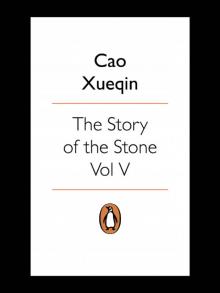 The Dreamer Wakes
The Dreamer Wakes The Warning Voice
The Warning Voice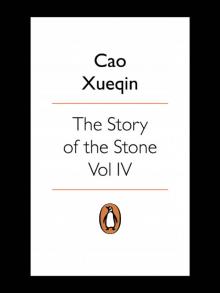 The Debt of Tears
The Debt of Tears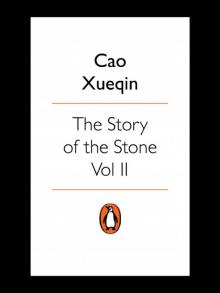 The Crab-Flower Club
The Crab-Flower Club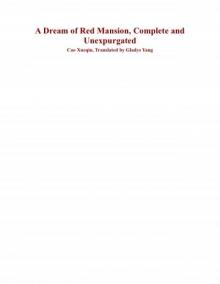 A Dream of Red Mansion
A Dream of Red Mansion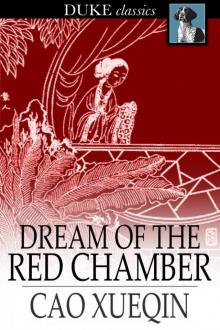 The Dream of the Red Chamber (Selection)
The Dream of the Red Chamber (Selection)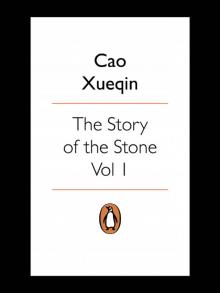 The Golden Days
The Golden Days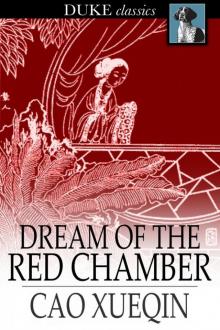 The Dream of the Red Chamber
The Dream of the Red Chamber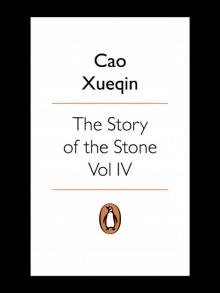 The Story of the Stone
The Story of the Stone